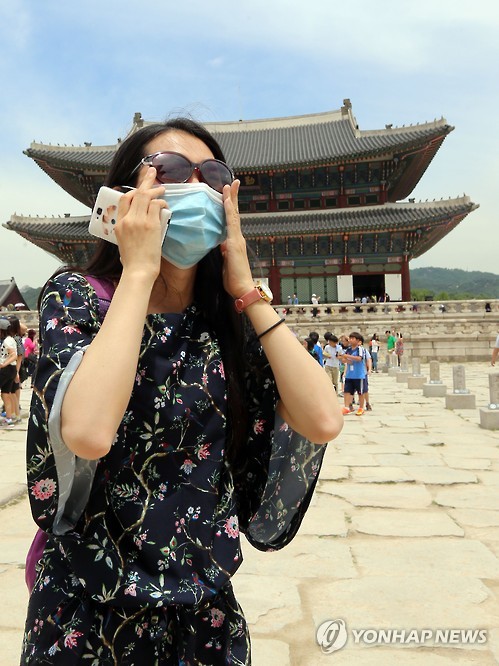- California Assembly OKs highest minimum wage in nation
- S. Korea unveils first graphic cigarette warnings
- US joins with South Korea, Japan in bid to deter North Korea
- LPGA golfer Chun In-gee finally back in action
- S. Korea won’t be top seed in final World Cup qualification round
- US men’s soccer misses 2nd straight Olympics
- US back on track in qualifying with 4-0 win over Guatemala
- High-intensity workout injuries spawn cottage industry
- CDC expands range of Zika mosquitoes into parts of Northeast
- Who knew? ‘The Walking Dead’ is helping families connect
S. Korea to ban people exposed to MERS from leaving country

A Chinese tourist, wearing a facial mask, visits Gyeongbok Palace in Seoul on June 1, 2015, as South Korea confirmed three additional cases of the Middle East Respiratory Syndrome that day, raising the number of patients diagnosed with the illness to 18. (Yonhap)
SEOUL/SEJONG, June 1 (Yonhap) — The South Korean government is moving to place a temporary ban on people exposed to the Middle East Respiratory Syndrome (MERS) from leaving the country, officials said Monday, as part of efforts to prevent the disease from spreading.
The move comes as a South Korean man, despite having come in close contact with a MERS patient and developing possible symptoms of the potentially deadly disease, left for China last week.
The 44-year-old man has since been diagnosed with the disease and is in isolation at a Chinese hospital.
The move also came as the country reported three more confirmed cases of MERS earlier Monday, bringing the total number of people infected with the disease to 18.
The latest infected people had been in the same hospital where the country’s first MERS case was reported. Two of them were patients in the hospital, while the other person is a son of another patient who had visited the hospital to care for his parent, the Health Ministry said.
They had not been monitored by the authorities as they had shown no symptoms of the disease when they were dismissed from the hospital, according to the ministry.
The total number of MERS infections reached 18 in 12 days since the first outbreak on May 20.
Still, the ministry said the country has yet to report any tertiary infections, meaning all 17 people diagnosed since the first case became infected after coming in close contact with the first patient.
A confirmed tertiary infection will make any of the 18 people who have been diagnosed a carrier.
Initially, the country had isolated only the people who have come in close contact with the first patient, who reportedly caught the disease while traveling to the Middle East in mid-April.
As a growing number of people are diagnosed with the disease, the government has begun to isolate every person who has come in close contact with any of the patients.
As of Monday, 682 people out of 715 who have come in close contact with any of the patients were in isolation at state-designated facilities or their homes. The remaining 33 have been released as they showed no symptoms of the disease past a 14-day incubation period, according to officials from the Health and Welfare Ministry.
Health Minister Moon Hyung-pyo said the government is mobilizing all-out efforts to prevent further infection.
“This week will become a critical crossroads over whether MERS will continue to spread or subside,” Moon said in a policy coordination meeting with the ruling Saenuri Party officials in Seoul. “I am very sorry for worrying citizens and causing them anxiety.”
Meanwhile, a person who had come in close contact with the first patient has died while at a hospital in Suwon, located some 30 kilometers south of Seoul, according to hospital and health ministry officials.
The 58-year-old female patient, whose identity has been withheld, is believed to have died due to acute respiratory failure at around 6:00 pm., hospital officials said.
Health officials in the city said the exact cause of death has yet to be identified, also adding that the person had not been diagnosed.
The death, if linked to the disease, will mark the first-ever MERS-related death in the country and the second in Asia.
MERS is a viral respiratory illness that is fairly new to humans. There had been only 1,142 reported cases in 23 countries since the first case was confirmed in Saudi Arabia in 2012 with all cases linked to countries in and near the Middle East so far.
There currently is no vaccine or treatment for the disease that has a very high fatality rate of over 40 percent.
















Pingback: South Korea Bans Travel for MERS Patients | ROK Drop
symptoms
January 15, 2018 at 7:26 AM
AIBSNLEA CHQ….Always Ahead….